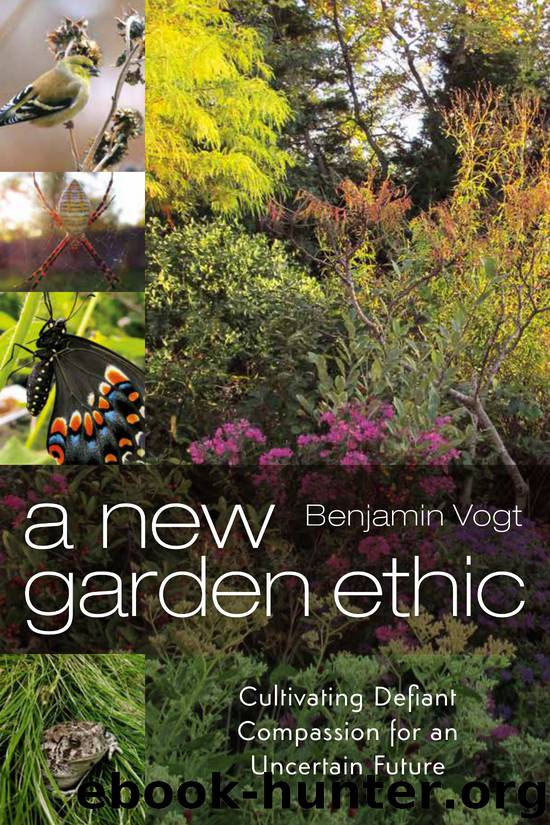A New Garden Ethic by Benjamin Vogt

Author:Benjamin Vogt
Language: eng
Format: epub
Publisher: New Society Publishers
Published: 2017-04-12T04:00:00+00:00
As we dig deeper into how we respond to perceived threats to our beliefs, we’re practicing critical thinking. It’s not the same as being critical or criticizing someone on a personal level, nor is it a process to attain personal pleasure from making an opposing argument. The success of freedom and democracy, and the extent to which we help other species and places practice these inalienable rights, is based on how well we think beyond the surface of our culture and our genetic hardwiring. It’s what scientists Robert Ornstein and Paul Ehrlich propose, that we need to force our own evolution to catch up with our planet-wide crises. But we now live in a culture where critical thinking—calling into question assumed beliefs and the status quo given to us by those in power—is demonized. A culture where activism is seen as terrorism and knowledge is distrusted if we disagree with it.
A thoughtful opinion piece by author Greg Lukianoff and psychologist Jonathan Haidt appeared in The Atlantic, titled “The Coddling of the American Mind.” The authors explore how free speech and critical thinking in our universities and colleges is being undermined by the phenomenon of trigger warnings, a practice wherein professors and others forewarn students that books, lectures, films, and other experiences may trigger a form of post-traumatic stress disorder that makes students uncomfortable. The concept of trigger warnings is not an idea to be dismissed, especially as they are designed to protect those who have experienced previous physical or emotional trauma. During my years of university teaching, I had plenty of students come to me after class or during office hours—sometimes even in class discussion—who shared their stories of abuse, rape, depression, chemical dependence, and more, seeking my advice and help on how to deal with them in the face of challenging texts that brought difficult experiences back to the surface.
I don’t pretend to be a psychologist or therapist, but many times I had to simulate one as a professor, and the best way to do so was to listen. The second-best way was to ask questions that helped the student explore, confront, and process their emotions. We often did so by writing personal essays, which afforded us the time to carefully consider how our lives, our emotions, and our responses were empowering and life-changing, and could even help others who read or heard about them. Working through these responses is no easy thing at any age. Time and again I saw the student with the most resistance and doubt become the most vulnerable, and in turn write the truest, most affecting sentences of their lives. Perhaps when we tune into our fears and preconceptions, we can, at least some of the time, come to know ourselves and our world more authentically and more powerfully. Maybe this is where radical activism begins. Just as we need nature to punch us in the gut, we may need our ethical ideologies to do the same.
The recent trend of trigger warnings noted by
Download
This site does not store any files on its server. We only index and link to content provided by other sites. Please contact the content providers to delete copyright contents if any and email us, we'll remove relevant links or contents immediately.
Turbulence by E. J. Noyes(8036)
The Thirst by Nesbo Jo(6921)
Gerald's Game by Stephen King(4636)
Be in a Treehouse by Pete Nelson(4029)
Marijuana Grower's Handbook by Ed Rosenthal(3672)
The Sprouting Book by Ann Wigmore(3583)
The Red Files by Lee Winter(3411)
The Remains of the Day by Kazuo Ishiguro(3388)
Sharp Objects: A Novel by Gillian Flynn(3004)
Organic Mushroom Farming and Mycoremediation by Tradd Cotter(2684)
Christian (The Protectors Book 1) by L. Ann Marie(2679)
The Culinary Herbal by Susan Belsinger(2472)
Stone Building by Kevin Gardner(2388)
The Starter Garden Handbook by Alice Mary Alvrez(2329)
Lilac Girls by Martha Hall Kelly(2291)
The Unlikely Pilgrimage of Harold Fry by Rachel Joyce(2262)
The Lean Farm Guide to Growing Vegetables: More In-Depth Lean Techniques for Efficient Organic Production by Ben Hartman(2125)
Urban Farming by Thomas Fox(2099)
Backyard Woodland by Josh VanBrakle(1924)
